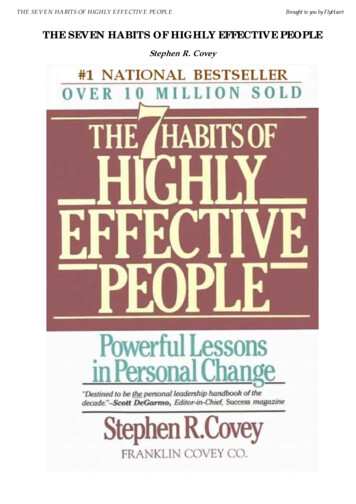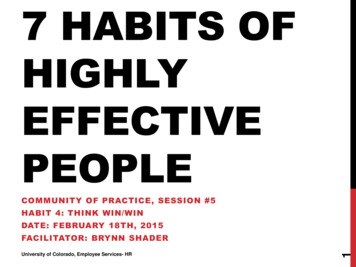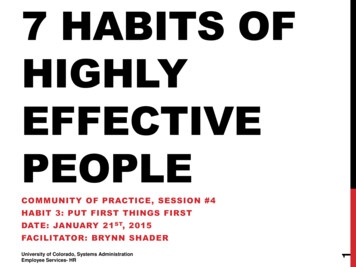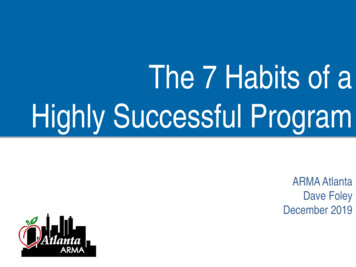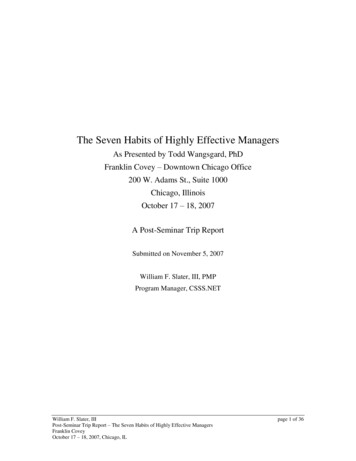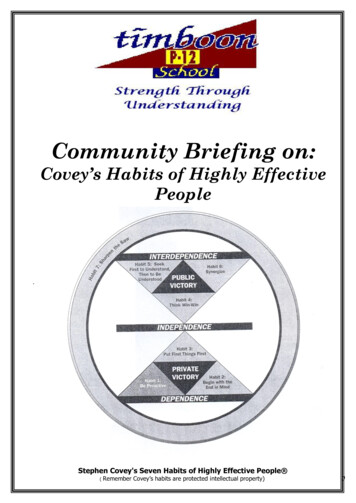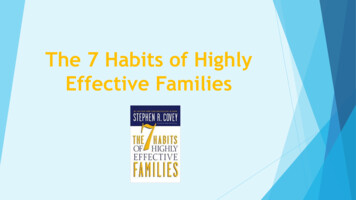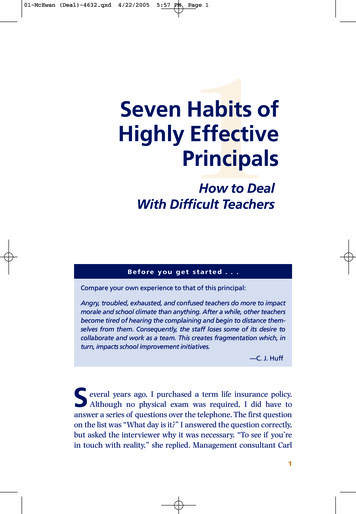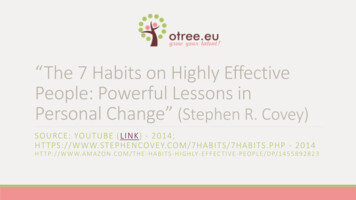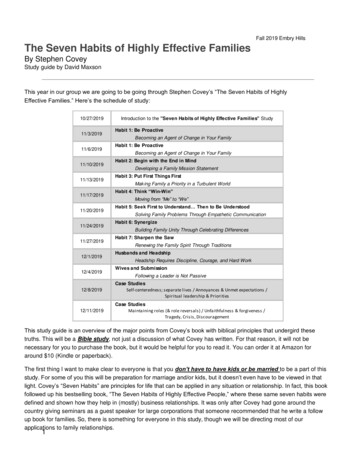
Transcription
THE 7 HABITS OF HIGHLY EFFECTIVE TEENSThis document is restricted for personal use only
B O O K S U M M A RYThe 7 Habits of Highly Effective Teens:T H E B O OKThe Ultimate Teenage Success GuideSean CoveyBeing a teenager is tough. You are supposed to fit in, excel at school, makeyour parents proud, and so on, but something is not right. There’s too muchto do and not enough time. Your life feels out of your control, and yourIN T RODUC TIONparents aren’t actually helping. You feel stressed out or depressed. SeanCovey wrote The 7 Habits of Highly Effective Teenagers to help you dealwith your life. You’ll learn that all happy teenagers have a set of habits incommon. They are not super smart or talented. Their secret weapon is justa set of habits – and you can build those habits too. If you want to changethe world around you, begin with yourself. Build your self-confidence andcharacter, then work on your relationships. To make it easier for you, we’vepicked the most useful ideas and action steps from this book, so you canstart improving your life right away.“We are free to choose our paths, but we can't choose the consequencesthat come with them.”5 B E ST QUOTES“Education must be a lifelong pursuit. The person who doesn't read is notbetter off than the person who can't.”“Since your destiny is yet to be determined, why not make itextraordinary and leave a lasting legacy? As you do this, remember, life isa mission, not a career. A career is a profession. A mission is a cause. Acareer asks, “What’s in it for me?” A mission asks, “How can I make adifference?””“It’s hard, but sometimes it is better to have no friends for a time than tohave the wrong friends. The wrong group can lead you down all kinds forpaths you really don’t want to be on and retracing your steps can be along hard journey. ”“It takes faith to live by principles, especially when you see people close toyou get ahead in life by lying, cheating, indulging, manipulating, andserving only themselves. What you don’t see, however, is that breakingprinciples always catches up to them in the end.”B O O K S U M M A R Y : T H E 7 H A B I T S O F H I G H LY E F F E C T I V E T E E N S 0 1
B O O K S U M M A RY1 . W HAT YOU SE E I S W H AT YOU GE TWe don’t really know ourselves, other people, or about life in general. We10 B IG IDEASonly have our perceptions – aka paradigms – about the way things are. Theyare inaccurate or incomplete, but they still affect our reality. Negativeparadigms create limitations, while positive ones can be helpful. Much ofour troubles come from contorted paradigms, which we can actually fix. Anegative self-paradigm, such as “I am dumb” will make you act dumb. Tofix it, spend as much time as you can with someone who believes in you.Similarly, a negative paradigm of someone else will influence yourrelationship with that person. To make sure a false belief is not messing upwith your relationships – don’t judge people before you know all the facts.2 . A LL C HANGE BEGI N S W I TH YOUThink for a second about your goals. What do you do to achieve them?What battles do you fight? The most critical battlefield in your life is withinyou. Before you even try to win a public victory, you need to gain a privateone. If you feel you need to change anything around you – like your parents,your boyfriend, or a teacher – change yourself first. Change always occursfrom the inside out. If you want to fix others, fix yourself. Look at the mirrorand deal with your own character.3. B E P R OACTI VE, NOT R E ACTI VE ( H a bi t 1)People are either proactive or reactive. Proactive people take responsibilityfor their lives. The reactive blame circumstances or other people. Habit 1says – be proactive, take responsibility for your happiness and unhappiness.It is all about the way you make choices. Reactive people listen to theirimpulses. If they’re shaken, they explode. They whine and complain, blameothers, and feel like victims. Proactive people think before they doanything. Their choices are based on values. There’s no point in wastingyour time and nerves on things you can’t control. Focus on the things thatyou can – your choices, responses, attitudes, yourself. You can even turnsetbacks into triumphs.4 . HAV E TH E E N D I N MI N D ( H a bi t 2)Habit 2 says, begin with the end in mind. Decide where you want to go anddraw a map to get there. Decide on your values, set your goals, and you’llget a direction. You are at a critical crossroads in life, and a clear sense ofdirection is now more important than ever. You are free to choose yourpaths, but the consequences of those choices will affect you forever. If youjust go with the flow, it may take you downhill. Also, if you don’t decidewhat you’re going to do with your life, someone else will do it for you.B O O K S U M M A R Y : T H E 7 H A B I T S O F H I G H LY E F F E C T I V E T E E N S 0 2
B O O K S U M M A RY5. PUT F I R ST TH I NG FI R ST ( H a bi t 3)There’s not enough time to do all the things you’ve got to do. Good10 B IG IDEAStime-management skills are not enough. Put important things first in yourlife. Keep going where you want to be going, and don’t let anything get youoff course. Organise yourself. Decide what is important (activities thatcontribute to our goals) and what is urgent (things you have to dosomething about urgently). Now, draw a square with four quadrants. Q1 isurgent and important. Q2 is important but not urgent. Q3 is urgent, butnot important. Q4 is neither urgent nor important. Where do you spendmost of your time in? Say no to urgent stuff that is not important and cutdown on time wasters. Discipline is the key. According to Albert E. Gray,the common ingredient of success is this: “All successful people have thehabit of doing the things failures don’t like to do. They don’t like doingthem either necessarily. But their disliking is subordinated to the strengthof their purpose.”6 . LI F E I S MADE OF – R E L ATION SH I PSWhat is it like to be in a relationship with you? What would your friends,siblings, parents, girlfriend/boyfriend, or teachers say about you? In life, it isall about relationships. Take care of them, but start with yourself. You arethe most important ingredient in any relationship. Think about how muchtrust and confidence you have in each of your relationships. You can fix orbreak any relationship by the way you act in different situations. Keeppromises, be kind and loyal, listen, and say sorry when you need to.7. THI N K W I N -W I N ( H a bi t 4)People usually have one of four attitudes toward life: win-lose, lose-win,lose-lose, or win-win. Win-lose is all about competition. It says – it’s me oryou. This attitude makes you focused on winning and being the best. Thewin-lose conditioning makes you do stuff like using people for your selfishpurposes, spreading rumours, trying to get ahead at the expense ofanother, and being jealous. Lose-win is the attitude of the doormat. It’seasier to give in and let anyone have their way with you than to be assertiveand try to share your feelings with them. Lose-lose is what you get whentwo win-lose people get together. It says, if I lose, you’ll lose too; you’regoing down with me. Revenge and war are also examples of the lose-loseattitude. Win-win attitude says, both of us can win. It is not me or you. Youwon’t step on the other person, and you won’t let them step on you. There’san abundance of success, so there’s enough for anyone. Win-win thinkingis the key to getting along well with other people.B O O K S U M M A R Y : T H E 7 H A B I T S O F H I G H LY E F F E C T I V E T E E N S 0 3
B O O K S U M M A RY8. SEEK FI R ST TO UN DE R STAN D, TH E N TO BE UN DE R STOOD( Hab it 5)First, listen. Then talk. See things from another’s point of view before10 B IG IDEASsharing your own. It is the key to communication because everyone has theneed to be understood and valued for who they are.Most people don’t listen, or they have one of the five poor listening styles.They either space out, or pretend to listen, listen selectively, pay attentionto words only, or are self-centred while listening. The last means that welisten from our own point of view. Because of that, our reply is notappropriate. We judge, advise, and probe others, and each is terrible for ourrelationships. Only genuine listening leads to real communication. Payattention to words, body language, tone and feelings, and try to stand inthat person’s shoes. When people (even your parents) feel that youunderstand them, they will trust you, and they’ll be more willing to listento you.9. SYN ERGI Z E ( H a bi t 6)When you work together with someone to create a solution that is betterthan anything any of you could do alone, that’s synergy. It is a far better waythan my way or your way; it is a higher way. It is like flying through life in aV formation, and not on your own. But synergy is not spontaneous. Youneed to learn it, and the first step is to celebrate differences in age, wealth,education, religious beliefs, language, skills, interests, dress, style, and ofcourse race and gender. Each of us has different paradigms aboutourselves and the world. Now, there are several ways to handle diversity.Some people shun it, others tolerate it, but the right way is to celebrate it.Diversity creates creative sparks, which, in turn, create opportunities.10 . SHA RPE N YOUR SAW ( H a bi t 7 )If you want to saw down a tree, it is better to take 15 minutes to sharpen thesaw than to spend hours using a dull one. If you're going to deal withdifficulties in your life, you have to keep your personal self sharp. Take careof your body (exercise, sleep, eat healthy food), brain (educate, read, write,learn new skills), heart (build relationships, laugh), and soul (pray,meditate, keep a journal). All four are equally important, so try to find thebalance. Never stop hoping. Okay, your family life is horrible, and so areyour grades, and the only person you have a good relationship with is yourcat – so what? There are so many ways in which you can improve your life.Just keep hope alive, and then choose something to work on. Choose oneor two habits and start practising it. You can also teach it to someone else.That way you’ll internalise it and help someone at the same time.B O O K S U M M A R Y : T H E 7 H A B I T S O F H I G H LY E F F E C T I V E T E E N S 0 4
B O O K S U M M A RY1 . M A N AGE YOUR PE R SON AL BAN K ACCOUN T ( PBA)Imagine a bank account that consists of how you feel about yourself. Let’s3 AC T ION STEPScall it a personal bank account (PBA). You can make deposits into it, andyou can take withdrawals from it. If your PBA is poor at the moment, don’tget depressed. You can’t fix it right now, but you can start improving it bymaking small deposits. Keep promises to yourself. Do small acts ofkindness. Be gentle with yourself. Be honest. Take care of yourself. Tap intoyour talents. If you do that regularly (and if you don’t take withdrawals veryoften) you’ll build a healthy and rich PBA.2 . G R OW YOUR PR OACTI VE MUSCLEAre you proactive or reactive? Just listen to your language. Do you often say“that’s just the way I am,” “there’s nothing I can do,” “I’ll try,” “I can’t,” or “youruined my day”? Reactive language takes power away from you and gives itto someone or something else. Proactive people say “I’ll do it,” “I can dobetter than that,” “I choose to,” “let’s look at all our options,” “there’s got tobe a way,”. Think “can-do.” Don’t wait; take the initiative. You’re human, nota dog. Don’t react based on impulse. Turn the pause button on, and useyour human tools: self-awareness, conscience, imagination, and willpower.Your self-awareness lets you see your thoughts and actions. Yourconscience gives you the means to know right from wrong. Yourimagination allows you to envision new possibilities. Your willpower givesyou the power to choose how to respond.3. P R AC T ICE W I N -W I N TH I N K I NGIt is not easy to be happy when your friend gets something, and you don’t.It may also be hard to find solutions to problems so that both of you canwin. But you can do it. If it is too hard for you, it means that you still haven’twon the private victory, so you are insecure, you feel threatened by others,and so you are jealous. Start with yourself and stop competing andcomparing. When you manage to change your thinking, notice the goodfeelings the win-win attitude brings on.B O O K S U M M A R Y : T H E 7 H A B I T S O F H I G H LY E F F E C T I V E T E E N S 0 5
B O O K S U M M A RYThe key is within you. Public victories – in sports competitions, atschool, work, or any other arena – are not real victories; they are merelythe consequences of battles fought and won long before. Internal1 KE Y TA K EAWAYvictory goes before the public one, so deal with yourself first. The onlyway to improve anything is to alter your decisions and attitudes.Commit to success, and you’ll succeed. Commit to being a betterfriend, and your relationships will flourish. All change starts with you.B O O K S U M M A R Y : T H E 7 H A B I T S O F H I G H LY E F F E C T I V E T E E N S 0 6
want more?visit thehopefullinstitute.comemail hello@thehopefullinstitute.comcall 61 2 9943 0350
Covey wrote The 7 Habits of Highly Effective Teenagers to help you deal with your life. You’ll learn that all happy teenagers have a set of habits in common. They are not super smart or talented. Their secret weapon is just a set of habits – and you can build those habits too. If you want to change the world around you, begin with yourself. Build your self-confidence and character, then .
